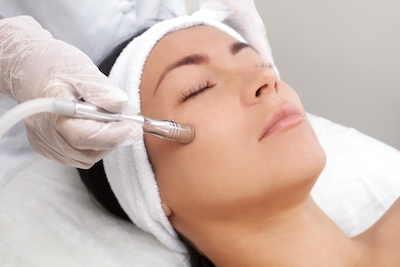 You take care of your skin and use moisturizer and sunscreen, yet dark spots, uneven skin tone, and possibly discoloration appears on your skin. These are all not-so-fun signs of hyperpigmentation which increase in appearance during warm, sunny months. Read on for more information about hyperpigmentation and its causes, numerous non-surgical hyperpigmentation treatments, and some simple tips to help you keep dark spots and hyperpigmentation at bay.
You take care of your skin and use moisturizer and sunscreen, yet dark spots, uneven skin tone, and possibly discoloration appears on your skin. These are all not-so-fun signs of hyperpigmentation which increase in appearance during warm, sunny months. Read on for more information about hyperpigmentation and its causes, numerous non-surgical hyperpigmentation treatments, and some simple tips to help you keep dark spots and hyperpigmentation at bay.
What Is Hyperpigmentation?
Hyperpigmentation is a common skin condition in which patches of skin or spots on the skin are darkened.
Hyperpigmentation may appear on the skin as:
- Freckles
- Age spots/ Sunspots/ Liver spots (small dark splotches)
- Melasma (areas of darkened skin)
The discoloration occurs when cells in the skin make too much of the pigment called melanin. Hyperpigmentation may be caused by:
- Injury or inflammation of the skin
- Sun damage
- Abnormal skin growths
- Hormone changes like pregnancy, or other medical conditions (e.g., Addison’s disease)
- A side effect of medications or tattoo removal

What Procedures Are Used To Treat Hyperpigmentation & Improve Your Skin’s Quality?
There are a variety of non-surgical treatments to improve excess skin pigment and renew and rejuvenate your skin. Some of the treatments that are not only effective but are safe for all skin types include:
HydraFacial® – In one treatment HydraFacial cleanses, exfoliates, peels, and extracts impurities, removes dead skin cells, and hydrates and rejuvenates the skin. Salicylic acid is used in combination with antioxidant-rich serums to treat the skin. This procedure effectively reduces the appearance of hyperpigmentation and may be recommended for you.
Chemical Peels – Chemical skin peels are customized based on an individual’s needs. A skin peel can be customized for aging skin, suns spots and pigmentation, acne prone skin, acne scars, and skin damage. There are 3 depth options available: Light, Medium, and Deep. Be sure to select a qualified medical professional for your peel to avoid complications (e.g., infection, scars). Chemical peels are not for everyone and may even cause your hyperpigmentation to worsen if improperly done.
Microdermabrasion – This mechanical exfoliation treatment improves dull, unevenly colored skin, pigmentation, sun damage, clogged pores, and aging skin. Microdermabrasion is gentle and effective for most skin types. However, if you have more than superficial hyperpigmentation issues this may not be a suitable non-surgical treatment option for you.
Laser & Light Treatments – Broad-band light (BBL), Fractionated laser skin resurfacing (laser peel), and Intense pulse light therapy (IPL) are a few of the laser/ light treatment options that may be used by your doctor to improve your hyperpigmentation issues. The laser treatment type will depend on the condition of your skin, your hyperpigmentation type, and your skin tone. Keep in mind that some downtime may be required following certain laser treatments.
There are a number of procedures available to treat hyperpigmentation, so be sure to check with a qualified aesthetic skincare professional for a procedure that will work best for your skin concerns and goals.

How Should I Treat & Prevent Hyperpigmentation?
Here are some simple tips or additions to your home skin care routine to help you effectively manage your hyperpigmentation!
Use Mineral Based Broad Spectrum Sunscreen
Always wear sunscreen when you’re going to be outside. It is the first line of defense against skin damage, especially hyperpigmentation and skin cancer. Mineral based broad spectrum sunscreens are best as they create less heat and are preferred for hyperpigmentation prone skin. Dr. Dennis Gross Skincare Lightweight Wrinkle Defense Sunscreen, Neutrogena Sheer Zinc Mineral Sunscreen, Supergoop! Mineral Matte Screen, and EltaMD UV Clear Broad-Spectrum Sunscreen are just some of the best available options.
Wear UV-Protective (UPF) Clothing
UV-Protective (UPF) Clothing absorbs and blocks harmful UV radiation which is great for everyone. UPF Clothing is one of the most effective forms of protection against sun damage and skin cancer. UPF is like SPF but for clothing so the higher the rating, the better the sun protection.
Reduce Your Exposure To Heat
Hyperpigmentation is almost always caused by the sun or a post inflammatory event. Being out in the sun means your skin is exposed to heat which can lead to inflammation. You can reduce heat exposure by planning your outdoor activities during times when the sun exposure is less (before 10 AM and after 4 PM). Also, if you enjoy hot yoga, maybe you should skip it as the excessive heat can trigger hyperpigmentation.
Add Skin Whitening Agents to Your Routine
Skin whitening agents are present in products that contain Tyrosinase inhibitors (e.g., kojic acid, L-ascorbic acid (Vitamin C), licorice root). They are effective in protecting your skin and actually prevents the hyperpigmentation from forming. It also helps reduce your pigmentation because it stops melanin production. Even though Tyrosinase inhibitors are called “skin whitening agents” they will not bleach your skin tone or make your skin lighter, so they are safe for all skin tones. Talk to your dermatologist for more information.
Exfoliate Your Skin Regularly
Exfoliation removes dead skin cells from the skin, and it helps reduce the excess melanin of hyperpigmentation by breaking up the cells and sloughing them off. You should consider visiting an aesthetic skin specialist periodically for either a physical or chemical exfoliation treatment to further reduce the signs of hyperpigmentation.
Don’t Pick Your Skin!
When you scratch and pick blackheads, pimples, mosquito bites, and other spots increases inflammation which also causes skin discoloration. Instead of picking acne and blackheads, use an appropriate face wash or visit a dermatologist if you are really struggling with skin issues.
Use Lotion or A Moisturizer Every Day
Moisturizing has many benefits which can include helping your skin stay young and healthy by allowing the skin to repair itself. You can use a high-quality lotion or moisturizer that ideally contains some of the following ingredients: low-strength alpha-hydroxy acids and azelaic acid to reduce inflammation, Hyaluronic Acid (HA) and Vitamin B3 to plump and firm your skin and skin whitening agents and UV protection to help prevent hyperpigmentation. StriVectin Advanced Retinol Intensive Night Moisturizer, KORRES Pomegranate Pore Blurring Gel Moisturizer, C.E.O. Vitamin C Rich Hydration Cream, and Neutrogena Bright Boost Gel Cream are a few great available options.
While there are a variety of treatment modalities that can help you lighten or get rid of the dark spots and patches, new ones can form. Even though you cannot cure all forms of hyperpigmentation, you can prevent it from developing again. Prevention is the best way to avoid hyperpigmentation. Take care of your skin!

Leave a Reply
You must be logged in to post a comment.